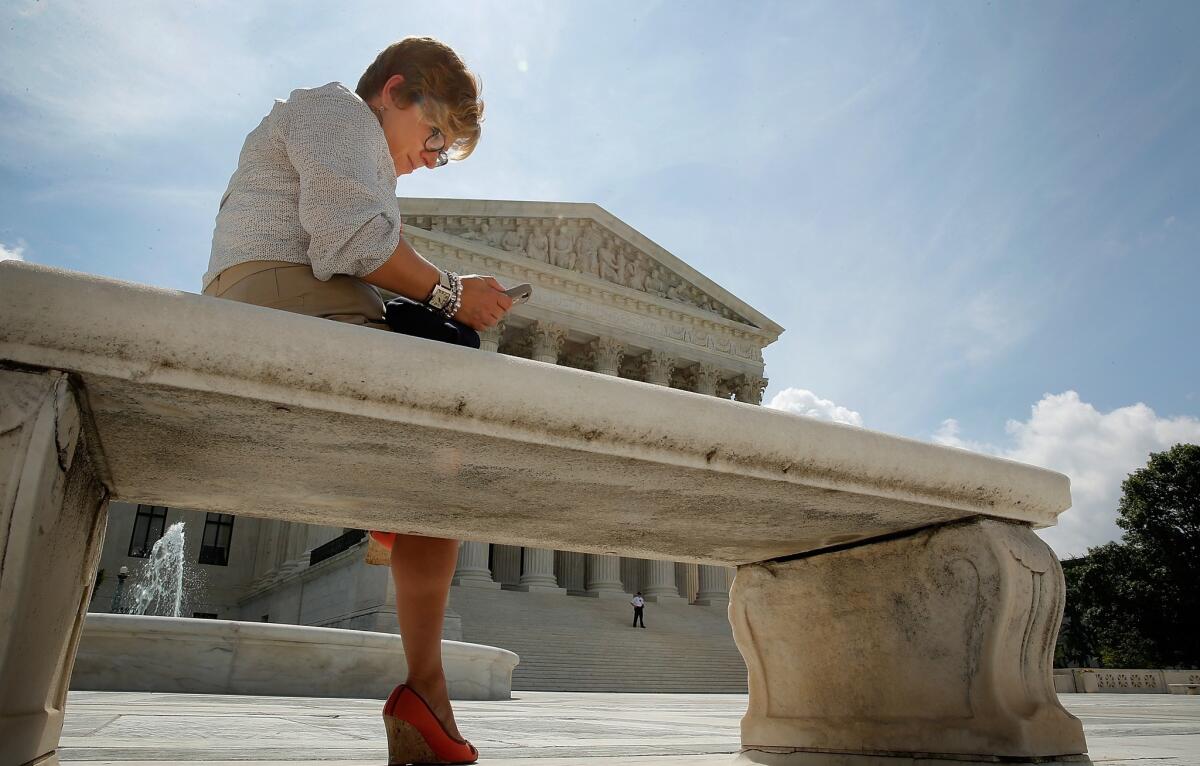Cellphone ruling could slow investigations, police say

The cops and deputies who patrol the streets of Los Angeles could be hampered and investigations slowed as a result of a U.S. Supreme Court ruling that says law enforcement officers must obtain a warrant before searching the contents of a smartphone or similar device.
The high court said that cellphones often contain “the sum of an individual’s private life” and ruled in favor of limiting the government’s ability to routinely search an electronic device without judicial permission.
After the ruling was handed down early Wednesday, Los Angeles Police Department Cmdr. Andrew Smith said that officers in the field were immediately notified. A one-page directive signed by Chief Charlie Beck was set to be sent to all department personnel, relaying the court’s decision and ordering an immediate end to cellphone searches without a warrant.
Smith said there were some immediate concerns about the impact the ruling may have on investigations, specifically the time it takes to get information.
He pointed to a hypothetical case: Officers detain one armed robbery suspect, but two others are still at large. In the past, he said, officers might look through the suspect’s cellphone for information — text messages or past phone calls — to try and quickly identify the others.
Now, he said, officers will have to first obtain a warrant.
“We are concerned that it’s going to take us longer to conduct these investigations — time it takes writing it up the search warrant, roll it to the district attorney’s office,” he said. “It’s going to take some time.
“That’s fine,” he continued. “We have judges in Los Angeles that work around the clock. They’re very accommodating.”
Sheriff’s deputies in Los Angeles County have typically searched the phones of people they arrested, based on a 2011 California Supreme Court case allowing such searches, said Asst. Sheriff Michael Rothans, who oversees patrol operations.
Now, deputies will refrain from searching cellphones unless they obtain a warrant, Rothans said.
County attorneys will review the Supreme Court decision and issue specific directives, which may include certain instances where warrantless phone searches are permitted, Rothans said.
The phones were “extremely useful,” Rothans said, allowing deputies to obtain information without probable cause.
Scrolling through the phones, they would sometimes find evidence of crimes unrelated to the original arrest – for example, child pornography on the phone of someone booked on a narcotics violation, Rothans said.
“It hampers us a lot, but it’s the law, and we’re going to follow it,” Rothans said.
Echoing Chief Justice John Roberts’ language, Lt. Kent Wegener of the sheriff’s Major Crimes Bureau said a cellphone is “a historical record of that person’s life, whether it’s a life of gangs, narcotics, prostitution or human trafficking.”
For major investigations such as homicides, detectives usually obtain a search warrant anyway, since they have time to do so, Wegener said.
A cellphone can document conversations between two people planning a crime, and its GPS can determine where a photo was taken to put the suspect near the crime scene, Wegener said.
More to Read
Sign up for Essential California
The most important California stories and recommendations in your inbox every morning.
You may occasionally receive promotional content from the Los Angeles Times.











